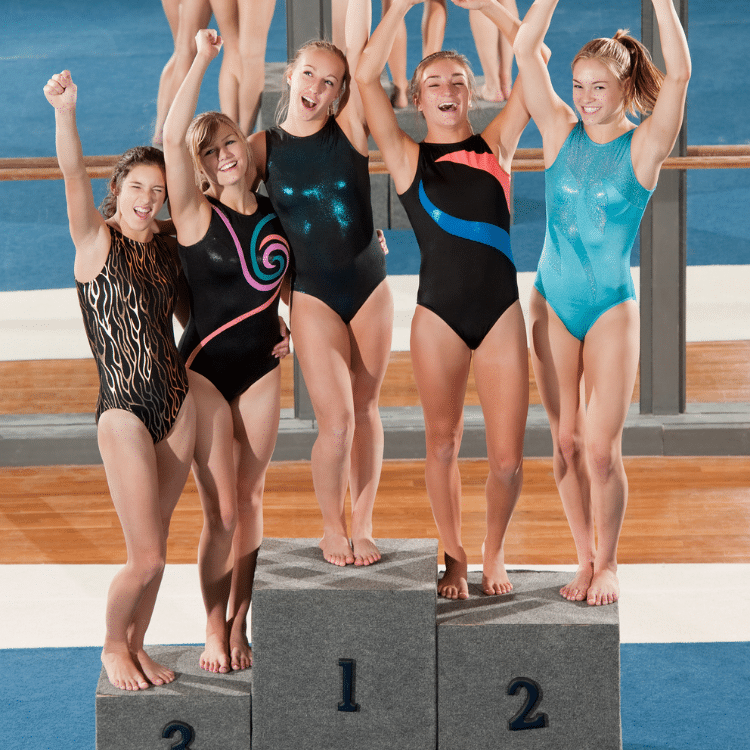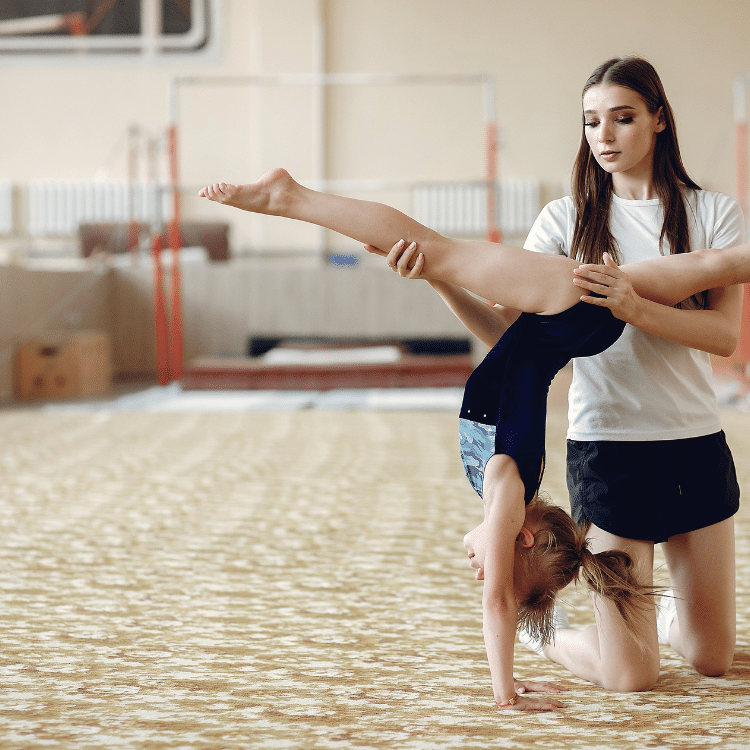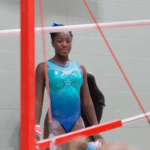
What makes a good gymnast? Strength, power, flexiblity to name just a few qualities. But there are lots of gymnasts that have the right physical qualities yet don’t achieve success.
Often it’s your personality and character that make the difference between achieving your goals in gymnastics. This is because gymnastics is such a mentally demanding sport – long training hours, tough exercises and brutal injuries mean that plenty of gymnasts quit early in their careers.
Having coached hundreds of gymnasts, these are the top 8 qualities I believe make a good gymnast.
Table of Contents
- Discipline in gymnastics
- Gymnasts need dedication
- Resilience in gymnastics
- Gymnasts have to be Punctual
- Gymnasts must Handle Pressure
- Passion makes a good gymnast
- Competitiveness is important in gymnastics
- Be Courageous
- Final Thoughts
- FAQs
Discipline in gymnastics
Discipline in gymnastics is probably the most important quality. It covers a wide range of meanings and situations and discipline also relates to some of the other qualities I mention elsewhere in this article.
Having good discipline means your behavior and attitude in training are on point. You’ll be ready when your coach needs you, you’ll listen attentively and do your best to apply any feedback you’ve been given. It will also mean you stay on task when you have a high number of reps to do on a tough drill (even when your coach isn’t looking!)
The word discipline in gymnastics is also used to describe different types of gymnastics or different competition types.
But don’t confuse the two meanings as they are different!
Gymnasts need dedication
Dedication to any sport is important. In gymnastics being dedicated means that you are always at practice (there’s a lot of practice to attend!) and you give it 100% effort all the time.
If you enjoy gymnastics then it is easy to be dedicated, the tough part is when training becomes more intense or you have a bad competition result. Successful gymnasts won’t let this affect their dedication and they will push through the tough times with more dedication than ever.
Resilience in gymnastics
Resilience in gymnastics is another key quality to help get through tough times. And yes, there will be tough times, especially if you are in a competitive environment.
There will be pressure to perform well from your coaches, family and teammates and the reality is that you won’t perform well every time. The same is true even for the best gymnasts. Yes, even Simone Biles can have a bad day! If you want to be successful you need to have the resilience to bounce back from those bad days and not let it get to you.
Gymnasts have to be Punctual
Being a good timekeeper might sound a bit basic but you would be surprised how many gymnasts turn up late to practice. If you can’t get to training on time you have to wonder if a gymnast’s focus and mindset will be affected.
There are plenty of gymnastics coaches who won’t let their gymnasts join training late. I’ve even seen a coach turn their own gymnast away from a competition meet because they were a few minutes late for registration. The coach’s point of view was that you have to set your standards high and that starts with punctuality.
And I agree!
Gymnasts must Handle Pressure
There are hundreds and thousands of gymnasts around the world, nailing it in training practice and absolutely smashing out routines. But when the time comes to step out in front of judges, spectators and other gymnasts, plenty of gymnasts find it hard to handle the pressure.
It’s very hard to replicate a competition in a training session so it can be a case of sink or swim when you get to the real thing.
There are plenty of strategies to help cope with handling pressure. Some gymnasts visualize positive outcomes whereas others find that having a specific routine can help.
One of the best pieces of advice I heard a sports psychologist say to a gymnast was to concentrate on the things within your control and forget about the things that you can’t. There’s no benefit to thinking about what your competitor does and there’s nothing you can do about it anyway. All you do is put more pressure on yourself.
If you concentrate on nailing specific parts of your own routine you are able to control the pressure you put on yourself much more.
Passion makes a good gymnast
Passionate gymnasts are easy to spot. They enjoy what they do and it shows all the time. Whether it’s in a competition floor routine or when they have to finish a mundane conditioning set, gymnasts who are passionate will be willing and happy to push themselves further.
Because they love gymnastics!
Passionate gymnasts stretch that little bit higher, point their toes an extra inch and keep smiling even when they take an extra step on landing (even if they smile through gritted teeth!).
Once you lose that passion for the sport, it’s probably time to hang up the leotard or at least take a break and reflect on what’s important.

Competitiveness is important in gymnastics
Being competitive gives you the drive to aim high. If you want to be successful you should be visualizing success and this ultimately means winning medals and being competitive.
There’s nothing wrong with being competitive (despite what some people say nowadays) as long as a gymnast knows how to avoid being over-competitive.
Being over-competitive will lead to jealousy and worrying about others whereas a successful gymnast will concentrate on improving their own performance and results.
Be Courageous
Gymnastics is a sport that requires an abundance of courage to overcome fear and push through to the next level. When you look at gymnastics skills logically, most sane people wouldn’t have the courage to flip and twist like gymnasts.
Luckily gymnasts become used to flipping, balancing and swinging fairly quickly. However, there will be a time when a gymnast needs the courage to move out of their comfort zone. Maybe it’s the first time to do a double somersault or a giant swing around the bars – your coach tells you that you are ready to go for it, you can feel the butterfly in your tummy and the adrenaline is pumping.
Now you need the courage to go for it!
Final Thoughts
If you are a gymnast who wants to be successful, try rating yourself out of 10 on each of the qualities I’ve listed. Which qualities are your strongest and which ones are your weakest? Set yourself a goal of improving weaker areas and if you want to develop even further try asking a teammate or even your coach to rate you.
Their answers might surprise you but even if they don’t, it’s good to make time to reflect and know yourself better.
If you need a bit of extra motivation, check out these top gymnastics quotes.
Have I missed any qualities that you think make a good gymnast? Feel free to get in touch and let us know!
FAQs
How do you progress in gymnastics?
To progress through the levels, gymnasts must achieve qualifying scores at events and demonstrate the ability to perform set skills and routines with confidence.
How do you get noticed in gymnastics?
Coaches often notice gymnasts that are mentally and physically tough. Be a hard worker and try to take on board any feedback that coaches give to you.
How tall can you be as a gymnast?
There are no height limits in gymnastics so you can be any height. Successful female gymnasts at the Olympics are usually around 5 feet tall and male gymnasts are usually around 5 feet 8 inches.
What age should a girl start gymnastics?
Most girls start gymnastics between the ages of 4 and 6. However, many gymnastics centers run pre-school gymnastics classes for toddlers which help develop agility, balance and coordination. There are also examples of girls who start as late as 8 or 9 and still have successful careers.
Latest Posts
- A Complete Guide to Gymnastics Rips
 Are you tired of dealing with painful gymnastics rips on your hands from training? Look no further – this article offers a comprehensive approach to… Read more: A Complete Guide to Gymnastics Rips
Are you tired of dealing with painful gymnastics rips on your hands from training? Look no further – this article offers a comprehensive approach to… Read more: A Complete Guide to Gymnastics Rips - The 12 Types of Trampoline (explained)
 Trampolines, a staple of joy and fitness, cater to all ages, inspiring kids and adults alike to leap out of their indoor routines into a… Read more: The 12 Types of Trampoline (explained)
Trampolines, a staple of joy and fitness, cater to all ages, inspiring kids and adults alike to leap out of their indoor routines into a… Read more: The 12 Types of Trampoline (explained) - How is Gymnastics Scored? (answered)
 In the world of gymnastics, every flip, spin, and leap is a blend of athleticism, precision, and artistry. But how is gymnastics scored accurately and… Read more: How is Gymnastics Scored? (answered)
In the world of gymnastics, every flip, spin, and leap is a blend of athleticism, precision, and artistry. But how is gymnastics scored accurately and… Read more: How is Gymnastics Scored? (answered) - Gymnastics Laser Beam: Revolutionizing Training
 Gymnastics continually evolves with innovative and helpful training equipment. Among these advancements, the Gymnastics Laser Beam by Tumbl Trak stands out, redefining the way gymnasts… Read more: Gymnastics Laser Beam: Revolutionizing Training
Gymnastics continually evolves with innovative and helpful training equipment. Among these advancements, the Gymnastics Laser Beam by Tumbl Trak stands out, redefining the way gymnasts… Read more: Gymnastics Laser Beam: Revolutionizing Training - 41 Gymnastics Bar Moves (explained)
 Gymnastics bar moves are considered some of the hardest in the whole of the sport due to the immense strength and flexibility needed to perform… Read more: 41 Gymnastics Bar Moves (explained)
Gymnastics bar moves are considered some of the hardest in the whole of the sport due to the immense strength and flexibility needed to perform… Read more: 41 Gymnastics Bar Moves (explained) - Level 5 Gymnastics Skills (Guide)
 This guide delves deep into the Level 5 gymnastics skills, providing insights, breakdowns, and an expert perspective on each skill and its significance in a… Read more: Level 5 Gymnastics Skills (Guide)
This guide delves deep into the Level 5 gymnastics skills, providing insights, breakdowns, and an expert perspective on each skill and its significance in a… Read more: Level 5 Gymnastics Skills (Guide)
